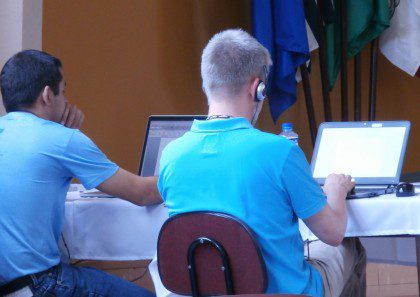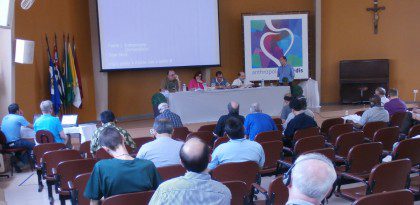Anthropologia Cordis, Taubaté, Brazil
Tuesday, February 4
The question of the day deals with whether or not we can point to any kind of anthropology in Dehon’s life and writing. To assist the conference, four theologians were invited to give an interview/panel discussion. I have included here the starting point for each theologian.
Rosana Manzini, is a former professor at Facultade Dehoniana and now a professor of Moral Theology at the Pontifical University of Sao Paolo:
For Prof. Manzini, the social actions and works of Dehon comes from his spirituality as a dialogical process. In the V Roman Conference, which focused on the social mission of the Church, Dehon’s stance was a reflection of his time but also looked forward. Dehon in the context of his culture and his time looked at how systems impact a person within their culture.
Who is Dehon speaking to in his writings? Who is the “man” Dehon would address today? There is something current that belongs to us now as much as in the time of Dehon. Every question of humanity must begin in Christ. Seeing humanity in Christ is the lens that we must use, a lens that sees Christ in the face of others, especially those who are oppressed. This is the insight of Dehon – to see Christ in both the social and spiritual life of people. Dehon saw in mistreated workers Christ being crucified today.
 Fr. Carlos da Silva, from North Brazil, is a former general councilor and now a professor of Social Doctrine:
Fr. Carlos da Silva, from North Brazil, is a former general councilor and now a professor of Social Doctrine:
Da Silva focused on Dehon’s call for us (SCJs) to get out of the Church and go to the people. How did Dehon change modernity by going to the heart of people? To understand social and spiritual problems as Dehon did is to go to the heart of the mission of the conference anthropologia cordis.
In many ways, Benedict XVI’s encyclical Caritas in veritate makes the same link as Dehon did – that charity and truth must go together to be authentic. Dehon united “veritas” from the Gospels, understanding “veritas” as justice, following the gospel’s lead, to bring justice to societies (note the plural). In Dehon’s time, many social organizations and systems were competing with one another (communism, capitalism, etc.). The Gospel – for Dehon – could give a vision of CARITAS, not in the sense of a material help only, but with a focus on the rights of the person. Dehon’s writings list several rights of workers, rights some works do not have even today.
As a theologian and sociologist Dehon sought to integrate these two realities of justice and truth. In the VIII Roman Conference, Dehon said that the situation of workers is caused by a violation of social rules and natural rights. The social system comes close to sin said Dehon. Dehon saw both natural and social aspects of “caritas” and “veritate”. Dehon saw unity between these dimensions of the person.
Fr. Antonio Teixeira from Venezuela has an STD from the Gregorian University and is now a professor at the Institute of Theology in Caracas.
Antonio began by focusing on Dehon as a man of heart and spirit. How did Dehon’s anthropology seek balance between the spiritual and economic realities of his time? In the past, the congregation’s books on Dehon tended to separate the concepts of his spirituality and his social action, the focus was to separate his social apostolate from his inner, spiritual life. This is not accurate to Dehon’s own life. Dehon’s spirituality was as a concrete man of his time, but we have to recover the dynamic man who grew out of his situation and observed the living conditions of people. Oblation became central to Dehon, but oblation was to deliver to the “other” (as in another person) what they need, realizing that the needs of people are both social and spiritual.
Fr. Joao Almeida has an STD in spirituality from the Gregorian University, a doctor of education, and is currently professor of Dogmatic Theology and Philosophy at the Facultade Dehoniana.
Joao focused on saying that to educate a Christian man is to give a man a heart. This education pulls one out of oneself. Anthropologia cordis is act of oblation, in that it gives man a heart that responds to others.
My own reflection [Fr. David Szatkowski]
I think the presenters’ focus on Dehon’s connection between the spiritual life and social life was a key insight for me. If we realize that we can have no separation between how we pray, how we live, how we treat other people, I believe we are living out of the vision of Dehon. To say Christ rules in Hearts and Societies demands an authentic unity between spiritual life and social life.
I found myself thinking about Const. 82.
Through our Eucharistic celebration, united with the whole Church in this memorial and present to its Lord, we welcome Him who brings us to live together, who consecrates us to God, and unceasingly throws us back onto the streets of the world in the service of the Gospel.
For us as Dehonians, we cannot separate out our spiritual life from our ministry, from our service to those around us. If we separate these two things, we lose the dynamism of the charism Dehon gave to us.
— Fr. David Szatkowski, SCJ


